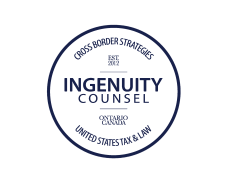 So, you’re the Personal Representative of an estate of a deceased Canadian with a vacation home in Florida (or a cottage in Michigan) with a fair market value on the date of death of $400,000 and an account at Bank of America with a balance of $12,000, who thinks the U.S. estate tax does not apply to you because your read on the Internet that $412,000 is significantly below the current U.S. estate tax exemption and therefore the estate is not subject to the transfer tax regime.
So, you’re the Personal Representative of an estate of a deceased Canadian with a vacation home in Florida (or a cottage in Michigan) with a fair market value on the date of death of $400,000 and an account at Bank of America with a balance of $12,000, who thinks the U.S. estate tax does not apply to you because your read on the Internet that $412,000 is significantly below the current U.S. estate tax exemption and therefore the estate is not subject to the transfer tax regime.
That would be true if your deceased person were a U.S. person, since the exemption for 2020 is $11,580,000. However, your deceased person is a non-resident, non-U.S. citizen and entitled to a mere $60,000 exemption. Meaning, your estate is absolutely subject to the U.S. estate tax. If you do nothing, the U.S. Internal Revenue Service (“IRS”) will come calling for payment of the estate tax which before interest and penalties would be $125,880. As the Personal Representative, you will be personally on the hook for that payment.
Thankfully, you’ve come to the right source in advance. If you file a U.S. estate tax return (Form 706-NA), adequately disclosing the deceased’s worldwide estate, including, among other things, an appraisal of all assets situated in the U.S., within 9 months of the date of death (or 15 months, if you timely file an extension), this hypothetical estate would not owe any U.S. estate tax.
The U.S. Canada Tax Convention (the “Treaty”) provides that a deceased Canadian’s estate can avail itself of up to the full estate tax exemption for U.S. persons, and avoid or minimize its estate tax liability, provided an adequately completed Form 706-NA is timely filed with the IRS. Even if it is passed the filing due date (or extended due date), there is opportunity to avoid or minimize a looming estate tax bill.
Whether you are a recently appointed Personal Representative or years have passed since the estate administration began, seeking experienced cross border estate and tax counsel will serve you well. Please do not hesitate to schedule a consultation by using our Consultation Form or call our office at 519-252-3888.
- What property is subject to the estate tax?
- How does the gift tax impact Canadians?
- What if my spouse and I own U.S. property as joint tenants?
- Will my executor have to probate my estate in the U.S.?
- Are there ways for my estate avoid probate in the U.S.?
I will answer these and other cross border questions in the new year, so please check back often and if you have a specific situation that you want addressed, please do not hesitate to contact us through our Consultation Form. You can also visit us at www.ingenuitycounsel.com.
About Ingenuity Counsel & Michael Kennedy
Ingenuity Counsel, based in Windsor, Ontario, Canada, provides cross border tax & United States legal services to Canadians. Michael Kennedy, with close to 20 years of legal experience, and his team at Ingenuity Counsel, advise Canadians who own property in the United States, particularly Michigan, California & Florida, with respect to federal income & estate tax, estate planning & probate administration.
Mr. Kennedy is an attorney-at-law admitted in the States of California, Michigan & Florida. He is also authorized as a Foreign Legal Consultant by the Law Society of Ontario to provide legal services in Ontario respecting the laws of the United States. Mr. Kennedy provides legal advice only as it pertains to U.S. laws. Prior to establishing Ingenuity Counsel in 2012, he practiced law in the United States for more than 10 years in California, Michigan and Florida. Michael has a U.S. law degree (JD) from Western New England University School of Law and his Master of Laws degree (LLM) from Georgetown University Law Center in Washington DC.
